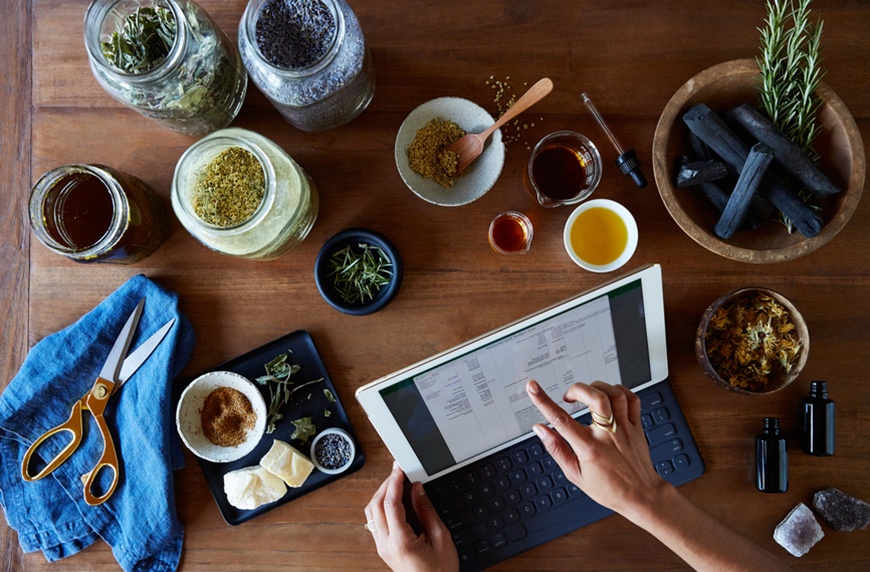Herbs have been used for mental and physical healing for centuries, but only recently have they begun to be recognized in mainstream Western culture. Now more and more people are turning to them to help with everything from depression, stress and anxiety to bloating and PMS.
However, as more and more people become interested in herbalism, many questions have arisen: What exactly is it? How can you actually find a legit herbalist? When should I visit a certified therapist or doctor instead? To address this list of questions, I spoke to Emily Berg, an herbalist at The Alchemist Kitchen, also known as New York's health hotspot, to learn more about plant-based health. I learned how to incorporate it into my life.
Berg began her education in botany as an environmental studies major at Ithaca College and then trained in herbal medicine at Heartstone School of Earth Essentials in Van Etten, New York. She now specializes in helping people use plants to reduce stress, anxiety, depression, and adrenal fatigue.
Before pursuing herbalism, Berg struggled with anxiety and depression. “I was working with a psychiatrist and trying different pharmaceutical options. It wasn't until I finally went off the medications and supplemented with herbs that I was able to truly find balance with my mental health. I did it,” she says. “It was something that worked for me and gave me the strength to want to learn more and share that healing experience.”
Related article
Here she offers helpful tips on when and how to work with an herbalist, whether it's for mental, physical, or hormonal health. Keep reading for her tips.
This is everything you need to know to become healthier with the help of an herbalist.
 Photo: Stocksy/Trinette Reed
Photo: Stocksy/Trinette Reed
The job of a herbalist and how to find a good herbalist
Simply put, herbalists use plants for healing. Unlike medical professionals, there are no certifications, but there are schools and certification programs for training. “They are based on different traditions,” Berg explained, adding that not all herbalists practice the same way. “What I learned is based on the herbal tradition of using plants from the northeastern United States for healing, but also from the herbalism of the southwest, which uses herbs native to drier climates, or “desert There is also “Herbalism.'' American herbalism may hold something like an ayahuasca ceremony. ”
When herbalists pursue certification, Berg says they can expect to learn exactly how herbs affect different parts of the body and study physiology. They are also taught common herbal mixtures, so they have an arsenal of elixirs to rely on when starting a meeting with a client. Many programs also incorporate nature walks, allowing aspiring herbalists to recognize the herbs they are studying in their natural habitat.
When it comes to finding a trusted herbalist, which is critical considering no license is required, Berg has some important tips. “Word of mouth is one great way, she says. Another way is to research a particular type of herbalist, because a lot of herbalists specialize in something,” she says. . Another less obvious place, Berg says, is Etsy, where you can research herbalists near you. “Many herbalists sell their products through her Etsy, and this way you can find someone who lives in your hometown,” she says.
It's also wise to find out a potential herbalist's schooling (weekend or other short courses are generally a red flag) and ask how long they've been practicing with clients.
 Photo: Stocksy/Trinette Reed
Photo: Stocksy/Trinette Reed
When to look for an herbalist?
Berg emphasizes that herbalists are not a replacement for doctors or mental health professionals, but each has a different role. In the event of a serious situation, a licensed medical professional is your primary point of contact.
But she says one reason to consider working with an herbalist is if you're looking for an alternative to pharmaceutical drugs or if you want to incorporate lifestyle practices like stress reduction into your healing. Her specialty is anxiety and depression, so she often works with people who want to transition off prescription medications. However, be sure to share this information with your doctor. Not all herbs and medicines mix well.
“Herbs are almost always better for you and have fewer side effects than prescription drugs,” Berg says, adding that herbs are a great way for people to feel empowered and in control of their own healing. . The price is also cheap.
The herbalist also provides information on how to incorporate herbs into your daily life, such as using herbs for digestion, sleep, relaxation, and even cleaning your home. “Using herbs regularly is a great way to connect with nature, especially if you live in a city,” she says. And some well-placed succulents.
Herbalist is a growing number of health-related titles, and an increasing number of young women are training to become shamans. This video shows what it's like to get the best pampering in New York.


